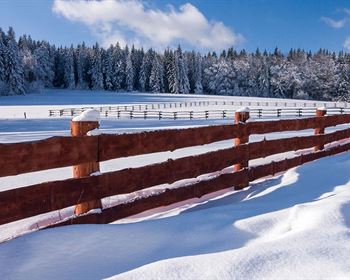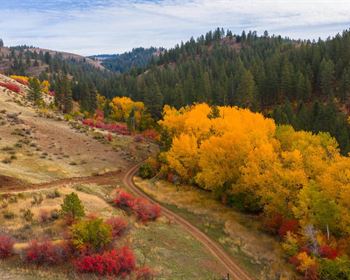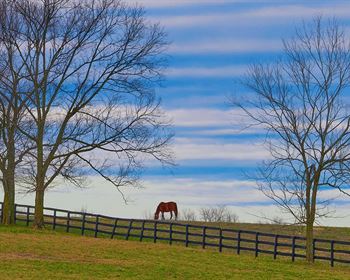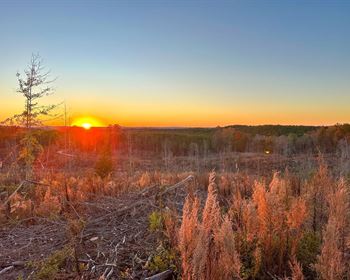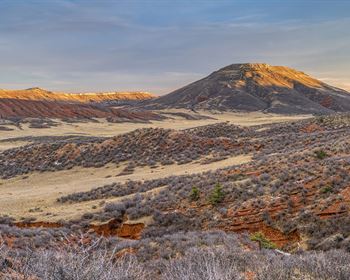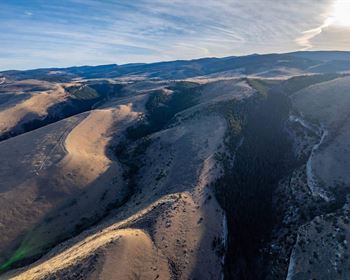Middle TN Hunting & Recreational
4105 Hwy 70 W : Dickson, TN 37055
Dickson County, Tennessee
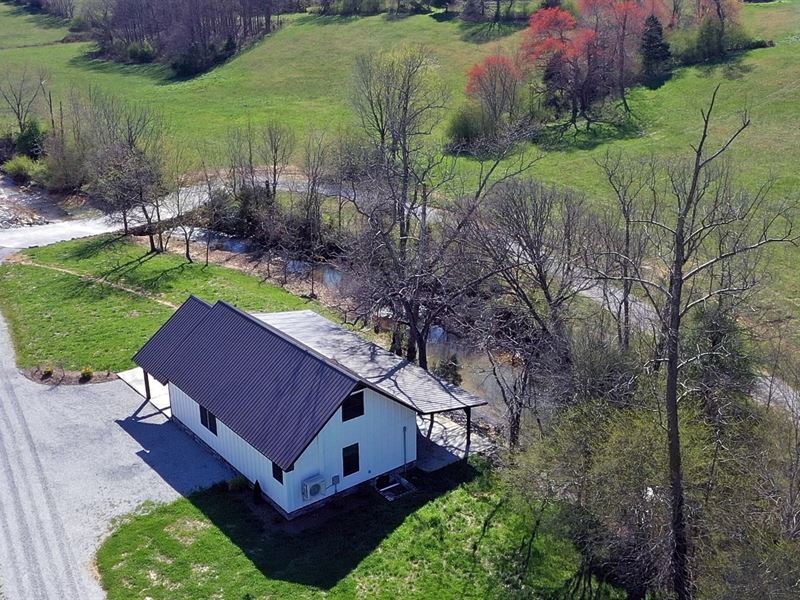
Ranch Description
Middle Tennessee Hunting & Recreational Property for Sale
Middle TN Hunting & Recreational Property For Sale located just a short 30 +/- minute commute from Nashville, Music City Usa. Exclusive Tennessee Ranch featuring Live Water a year round spring fed creek with two additional ponds, and an abundance of wildlife. A deer and turkey hunter's paradise.
This amazing Tennessee Farm features a newly constructed Cabin / Cottage situated on 171+/- acres of prime Hunting and Recreational Land. Cottage is perfectly positioned near the creek with two covered porches. Enjoy a cup of coffee in the morning or afternoon tea while watching the water flow though the creek which is just off the edge of the porch.
Interior features an open concept living design, with ample natural lighting pouring into the space and beautiful vaulted ceilings. Floor plan features approximately 1300 sq. ft. with 2 Bedrooms and 1.5 Baths, laundry room, downstairs master, and upstairs loft with 2nd BR. The spiral staircase in the home adds allure and preserves space. Kitchen features Island Bar with Butcher Block Countertop. Stainless Steel appliance package will remain with the home.
The land consist of approximately 70 pasture and 30 wooded acreage. There is an existing cattle barn and a newly refurbished 54x64 metal shop which is partially insulated and includes a full bathroom. Shop could be further finished out and made into a nice living quarter for guest, or potentially a B&B. Shop additionally features double automatic Roll Up doors and a working garage bay. Also wired with 220 amp service for your power tools.
Property has been intently manicured and managed for wild game harvesting. There are 3 hunting blinds located on site that have been specially positioned for optimal hunting. One Blind sits at the top of a bluff and has a 360 viewpoint, another low blind down by the creek, and a third blind positioned in the woods on the east side of the property. Many successful hunts have occurred on this Tennessee Hunting Farm.
Aside from the hunting and recreational opportunities this farm offers, there are several ideal sites to build a new custom home. This is a rare opportunity to acquire a tract of land which has been fully developed and ready to own. A true turn-key hunting and recreational property. Beautiful stamped concrete driveway crosses over the West Piney River Creek as you access the property.
Dickson, Tennessee - About the Area / History & Contextual Information
courtesy of
What is now the City of Dickson started as a stop on the railroad line between Nashville and the Tennessee River. When Union troops completed the supply line during the Civil War, the area was known as Mile Post 42, for the distance from Nashville. There are conflicting reports about what the growing community was originally called.
Dr. Robert Corlew's A History of Dickson County states it was called Sneedsville in honor of a railroad engineer named Sneed, who helped complete the tracks under orders from Gen. Ulysses Grant. There are numerous other documents that refer to Sneedsville but there is no record of it ever being chartered as an official town. On the other hand, former Mayor Robert S. Clement reports in his book From Mile Post 42 To City of Dickson 1980 that the late Henry Ragan discovered Chancery Court documents that contain a plat of the area identifying it as Smeedsville. Ragan also interviewed long-time residents who referred to the community by that name.
Corlew reports he found an 1867 Chancery Court document that incorporates the area as Sneedsville or Smeedsville, explaining that the old-style hand-written document is difficult to interpret the difference in an n or an m. Research done by Dickson County resident Thomas Forehand Jr. indicates the civil engineer is identified as E.C. Smeed in Goodspeed's 1887 History of Tennessee and as early as 1865 the name Smeedville appeared on maps and other documents, including records of court martial trials of members of the 100th United States Colored Infantry that was stationed in the area.
Around the same time, Forehand says there were other military reports that contradicted, specifically one by a Confederate cavalry unit that robbed a train near what is today the back part of Montgomery Bell State Park. The report places the raid between White Bluffs and Sneedville. An 1865 Union officer's report also refers to Sneedville. Forehand also cites an 1865 advertisement by the United States Postal Service seeking carriers for a route that included Kingston Springs, Hutton's Station, Turnbull, Sneedsville, Gillum's Station, Paradise, McEwen Station, Waverly and Johnsonville. However, later postal service documents reference Smeedville and Smeedville Station. In July 1869, the postal service made its first reference to the area as Dickson. Prior to that date, there are numerous property records that use Sneedville, Smeedville, Smeedsville and Smeedville Station.
What is clear is that in 1873 the court changed the name of the town to Dickson, like Dickson County honoring Dr. William Dickson, who was a physician who lived and practiced in Nashville. He was serving in Congress 1801-07 when the 25th Tennessee county was formed out of Robertson and Montgomery counties in 1803. Clement says there is no documentation of a reason for the change, but speculates it might have been to avoid confusion with Sneedville, a small town that still exists in Hancock County. Forehand says in December 1872, E.H. Andrews petitioned the Chancery Court in Charlotte to incorporate the growing village as the town of Dickson. On June 10, 1873, the citizens voted to incorporate as Dickson and the court granted its first charter in December 1873. After conflict arose over a state law that allowed liquor sales only within incorporated areas, citizens voted to abolish town of Dickson's charter on March 16, 1883, and Gov. William Bate signed an act doing so three days later.
The town of Dickson was incorporated again in 1899. Dickson was officially chartered by the Tennessee General Assembly in 1925. The population listed in the 1900 Census was 1,363. Dickson owes its beginning and early success to the railroad. There was a large switchyard in the area of West End Avenue. Passenger trains stopped daily at the depot still standing across from the Clement Railroad Hotel Museum, which was operated as the Halbrook Hotel and is the birthplace of Gov. Frank G. Clement. In addition to the rail connecting Nashville and the Tennessee River, the Cumberland Furnace iron industry kept two branch lines busy between Dickson and the Cumberland River in Clarksville.
By the 1940 Census, Dickson had grown to 3,504 residents. But the iron industry in the northern part of the county began to fade away and America's growing love with automobiles began decreasing the need for trains. Eventually the iron operations ceased and the tracks heading north were abandoned and removed in the mid-1900s. That slowed Dickson's growth and the town actually reported a 4.5 decrease in population to 3,384 people in 1950. Unlike other towns that saw their growth halted by decreased railroad use, Dickson benefited from the State of Tennessee's first east-west highway. In the early 1910S, Tennessee began planning a highway that would connect existing roads and add new portions to extend from Bristol to Memphis as State Route 1 and become part of U.S. Highway 70, which reached from the Atlantic in North Carolina to the Pacific in California.
In 1917, Dickson residents raised to survey a portion of the new road through the town and College Street became a part of the Broadway of America. While the early Dickson growth had centered along the railroad, College Street and the traffic of a coast-to-coast highway began to attract businesses and downtown grew to the north.
During the 1950S, the U.S. government launched construction of a series of interstates that would accommodate the country's quickly growing number of vehicles. With a little influence from Gov. Clement, Interstate 40 was constructed through the southern part of Dickson County just four miles south of Dickson and Highway 46 became a new lifeline. By the 1970S, commercial growth had begun to spread toward the interstate, which opened the City of Dickson to a new generation of travelers. Restaurants and hotels cropped up at the interchange and by the 1990S the City of Dickson had incorporated past I-40. The proximity to the interstate proved attractive to industries and in the early 1980S Dickson saw considerable growth in its industrial park, including attracting industries based in Canada, Japan, France, Belgium and Italy. The completion of I-840 from Dickson County to Wilson County creates a southern loop around Nashville that connects I-65 and I-24.
For more information about this magnificent Tennessee Game Ranch for Sale, contact listing agent.

